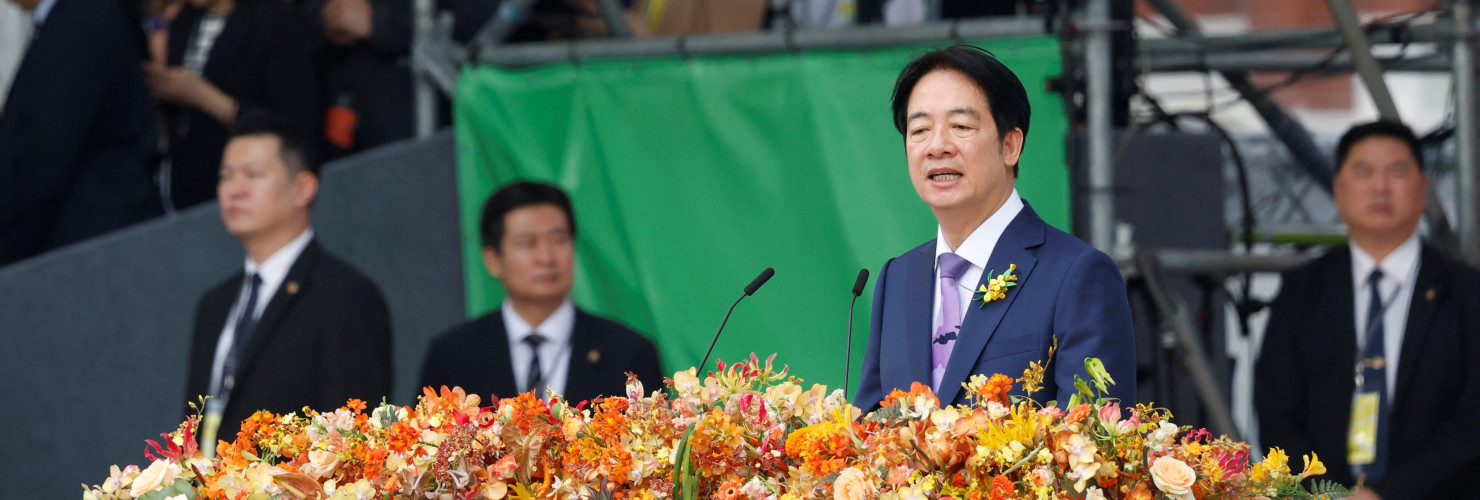

Taiwan’s new president counters Beijing’s “one China” narrative with “mutual non-subordination"
Thanks to political cover from Washington, Lai Ching-te can publicly muse about identity-defining contests with Beijing, says Claus Soong.
After Taiwan beat China to win gold in the badminton men’s doubles at the Paris Olympics in early August, Taiwanese President Lai Ching-te took to social media to praise players Lee Yang and Wang Chi-lin for “fighting tenaciously against strong opponents” and for having "united and inspired Taiwan”. He did not bend to the China-friendly Olympic convention of referring to his country as Chinese Taipei, instead suggesting that Taiwan's identity depends less on a name than on "fighting tenaciously" against a much larger China – both on the sports field and off it.
Taiwan’s new president appears to be testing an unexpectedly fractious tone with Beijing. Lai used his inauguration speech at the end of May to declare that Taiwan and China “are not subordinated to each other.” By musing so publicly about “mutual non-subordination”, Lai was signaling an ambition to redefine cross-Strait relations from those between two regions, Taiwan and China, or island and mainland, to those between two entities, the Republic of China (ROC), and People’s Republic of China (PRC) – which cannot both exist, according to the PRC’s “One China” principle.
Lai’s words surprised many Taiwanese observers and angered China
Lai’s words angered China, with the Communist Party’s People’s Daily accusing him of “blatantly promoting Taiwanese independence”. But they also surprised many Taiwanese. During the election campaign Lai had assured voters – and the international community – that he would maintain the “status quo” of Taiwan’s de facto independence and avoid provoking Beijing with any talk of de jure independence. Hung Chi-chang, a former chief negotiator in cross-Strait relations, for example, expected Lai to appoint more dovish figures to manage relations, and Lin Chong-pin, a former defense minister, called on Lai not to significantly raise tensions.
By positing “mutual non-subordination”, Lai was revisiting the “two-state theory” of “two distinct jurisdictions” proposed by Taiwan’s then-President Lee Teng-hui in 1999 to counter Beijing’s stock assertion that China and Taiwan were “one nation, two systems”. In doing so, Lai was taking advantage of a very different international situation: While the then-US President Bill Clinton had issued his “three nos” to Taiwan in 1998 – no support for independence, no “two Chinas”, no membership of international bodies requiring statehood – President Joe Biden had signaled in 2022 the US would defend Taiwan in the event of “an unprecedented attack”.
Lai has left the space for keeping the status quo
Beijing flanked Lai’s inauguration with muscle-flexing military exercises and was predictably displeased by his speech. But the changed international context also appears to have left its mark on Beijing. Xi Jinping reportedly told European Commission President Ursula von der Leyen in June that the US was trying to trick China into invading Taiwan, but that he would “not take the bait”. This is a clear sign that Beijing accepts that its rivalry with the US and its current economic difficulties at home limit its ability to effectively sanction Taiwan’s new president.
As unacceptable as Lai’s idea of “non-subordination” may be to Beijing, it remains tolerable enough because it stops short of crossing the red line – drawn as much by Washington as Beijing – of declaring independence. That would challenge the Chinese Communist Party’s (CCP) founding myth of one nation, one party, one state and very likely trigger a harsh response. Instead, Lai has left the space for keeping the status quo by maintaining the – increasingly theoretical – option of unification, preserving China’s nationalist narrative and the legitimacy the CCP derives from it.
Lai’s attempt to shift the idea of cross-Strait ties from one between regions to one between non-subordinated entities won’t improve Taipei’s relationship with Beijing. But improving Taiwan-China relations is not his top priority under changing geopolitical dynamics. As shown a three-decade tracking survey on Taiwanese identity shows, the self-identification of Taiwanese residents as wholly or partly Chinese has declined significantly. In contrast, the self-identification as Taiwanese has increased from 17.6% to more than 60%. A growing number of Taiwanese voters, especially younger ones, no longer views the other side of the Taiwan Strait as an extended family with which to engage.
Lai appears intent on using the increased political cover provided by both the Biden administration and China’s domestic concerns to challenge Beijing’s idea of “one China” and reshape international perceptions of cross-Strait relations. This reflects that he is neither under pressure internally from domestic voters nor externally from key allies like the US to improve cross-Strait relations. Maintaining an assertive stance will garner support from his independence-leaning political base in the next elections and better position Taiwan to counter China’s assertions on the world stage that there is only “one China” and that it’s ruled from Beijing.
